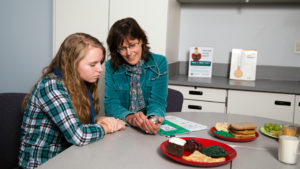In the United States, one out of every three adults has prediabetes. Given that shocking statistic, you might expect more attention to be focused on the issue. However, of the one-third of adults with prediabetes, nine out of ten don’t know they have it. That’s the challenge the Prevent T2 program at Providence St. Peter Hospital is designed to address, says program coordinator Rachel Akins. “We’re one of around 26 organizations in the country that have a CDC– recognized diabetes prevention program.”

The program lasts for a year and includes weekly meetings for the first six months and monthly meetings after that. Participants learn about lifestyle changes they can make to become healthier and reduce their risk of developing Type 2 diabetes which can lead to heart attacks, strokes and a multitude of other problems. Prevent T2 is so effective that it will become the first prevention program covered by Medicare starting in April, 2018, says Akins. “By making achievable changes in their diet and exercising more, people with prediabetes have been proven to cut their risk by 58%.”
Doctors can refer patients to the program, but patients can also refer themselves if they meet certain qualifying criteria such as being overweight or inactive or having a family history of diabetes. “They can give our office a call to schedule a free information and screening session,” says Akins. “We’ll be holding them in Olympia and Centralia.” Currently, some insurers cover the program, which otherwise costs a total of $442 for the year, or $17 per class.

Among participants, those with the highest attendance rates usually lose the most weight and make the most significant lifestyle changes, she notes. “Readiness to change is also important and we have a questionnaire at the beginning to assess where people are. We want to capture them when they’re ready to make a shift.” Support and accountability also play a large role in helping participants make those changes, she says. “Especially in the beginning, we need to have frequent meetings so they feel supported. It’s important to find a day and time that works with people’s schedules.”
The gradual nature of change makes it more achievable, she believes. “We get a lot of feedback that it’s refreshing to focus on making healthy eating choices and slowly adding more exercise. It doesn’t feel like a diet or a quick fix, so participants are more likely to stick with it. The group aspect is also key. We have people from groups that came through a couple of years ago that are still meeting today.”
Akins appreciates the effort participants make. “I work day to day for 90% of my job with people who already have Type 2 diabetes and are dealing with eye disease, kidney disease and amputations,” she says. “It’s really encouraging to see people taking preventative actions and committing time and energy to make healthy changes.”
To schedule a free information and screening session, call 360-493-7567. To learn more about prediabetes visit www.cdc.gov/diabetes/basics/prediabetes.html.
Sponsored
















































